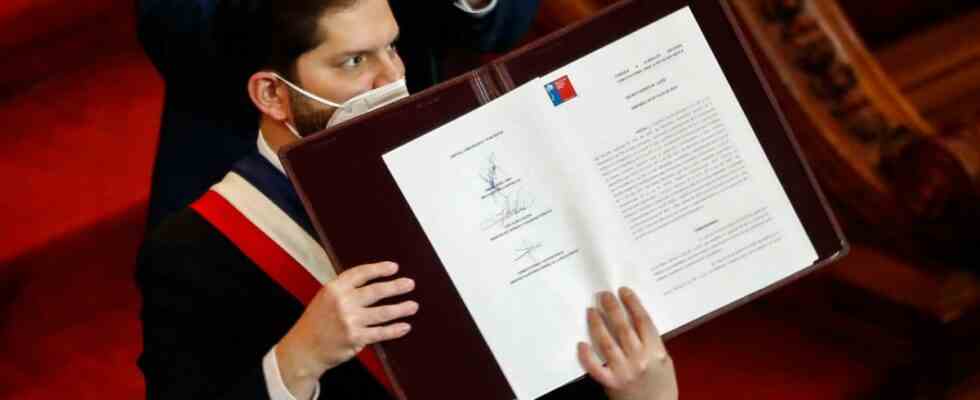Gabriel Boric pretty much nailed it: “I know it wasn’t easy,” said Chile’s young president at a ceremony in Santiago de Chile on Monday, at which a draft of the new constitution was handed to him. “But that’s the way it is, dear compatriots: Democracy is not easy.”
Exactly one year has passed since a Constituent Assembly began work in Chile. It was and is a huge democratic experiment: 154 MPs elected by the people were supposed to draft a new Magna Carta. After months of exhausting and tough work is now a work of almost 200 pages, 388 articles that could change Chile forever.
Among other things, the new constitution stipulates that all state institutions should be staffed with as many women as men. Article 51 guarantees the right to dignified and adequate housing, Article 61 stipulates the free development of sexuality and obliges the state to create the conditions for pregnancy and childbirth, as well as for voluntary abortions. While the indigenous peoples of the country were not even mentioned in Chile’s currently valid constitution, the draft now presented declares the country to be a plurinational state, interculturally and ecologically, in the very first article.
The Chileans now have two months to read through the new constitution. On September 4, there will be a vote on whether or not it should come into force.
The current constitution comes from Pinochet
Because in fact it is anything but certain that a majority will decide in favor of the draft. Chile’s current constitution dates back to the bloody military dictatorship. Back then, in the early 1980s, General Augusto Pinochet gave the country a Magna Carta entirely according to his wishes, with a strong president, a powerful military and a radically free-market economic system.
Education, health, even access to water: everything has been placed in private hands as much as possible. Chile became a neoliberal economic miracle, poverty fell and prosperity increased, but over time it became increasingly obvious that it was not reaching all sections of the population.
While large landowners can now lavishly irrigate their plantations with free water from their private wells, a few hundred meters away not a drop comes out of the tap of the residents of the next village. And while the rich and powerful dine in upscale restaurants in Santiago’s posh districts, on the other side of the city whole families sit on the streets begging because they have neither food nor a roof over their heads.
In 2019, dissatisfaction with these conditions culminated in gigantic mass protests. Chile’s then President Sebastian Piñera reacted with incomprehension. The extremely wealthy entrepreneur and conservative politician first sent the police, then the military. When none of this helped, they grudgingly approached the demonstrators and promised a constitutional referendum.
A wish list of left-wing activists?
In October 2020, 78 percent of voters were in favor of a new constitution. However, and this is the problem, turnout was just over 50 percent. When the members of the Constituent Assembly were to be elected, even fewer people went to the polls. Above all, the conservative and traditional parties in the country could not or did not want to mobilize their supporters. In the end, therefore, mainly independent and left-wing candidates were elected to the committee.
Conservative critics object that the draft constitution now presented is little more than a wish list for left-wing and indigenous activists. They warn that it would mean the end of the Chilean economic miracle, of the rule of law and of democracy.
This is of course an exaggeration. Nevertheless, approval of the new constitution is dwindling, as is that of the young President Gabriel Boric. He only took office in March. The hopes were huge back then, but so were the challenges. In the south there are riots with radical activists of the Mapuche people, in the north residents are demonstrating against immigrants, and on top of all that there is inflation and crime.
Boric now called for the vote on the constitution not to be one on his government: “This is about Chile’s future,” he said. But no matter how the election ends, there is already something that all Chileans can be proud of: “At the moment of the deepest crisis, we decided for more democracy – and not for less.” From the President’s point of view, all the effort has already paid off.

